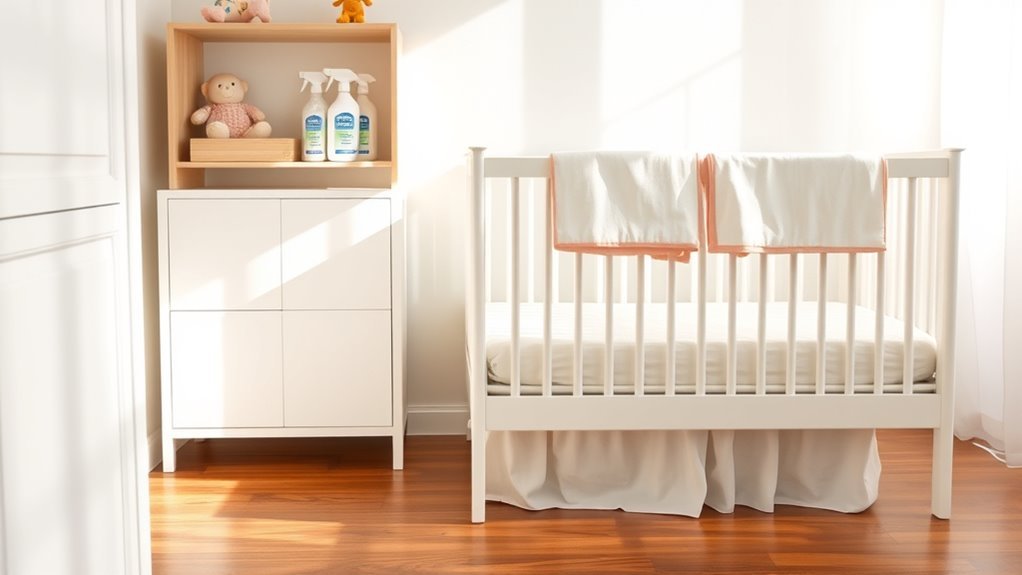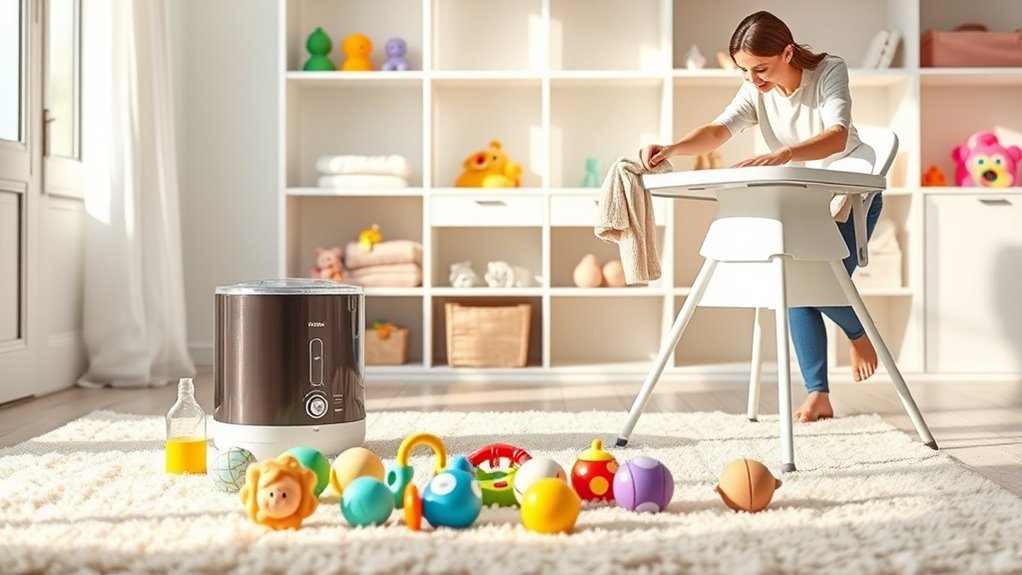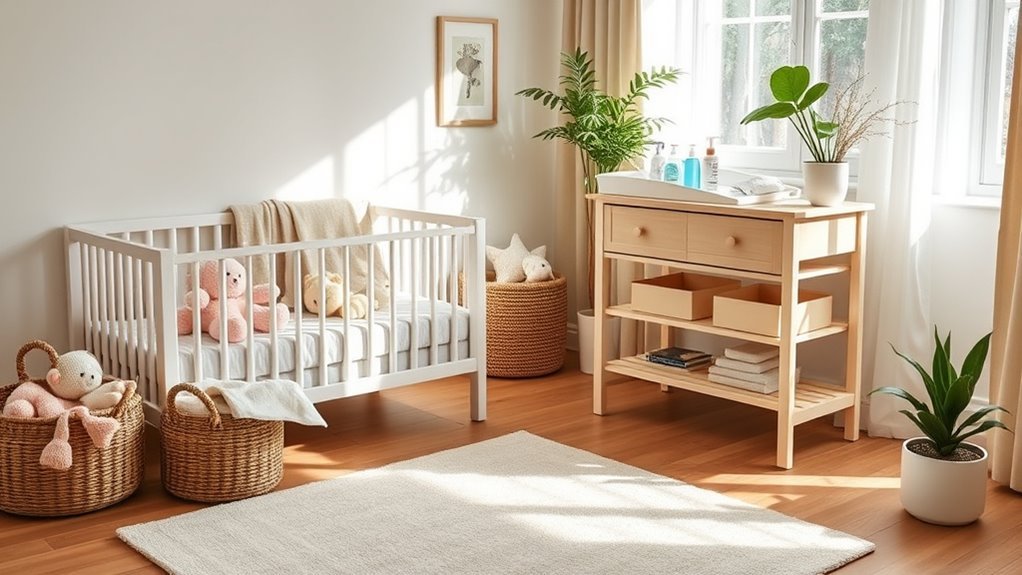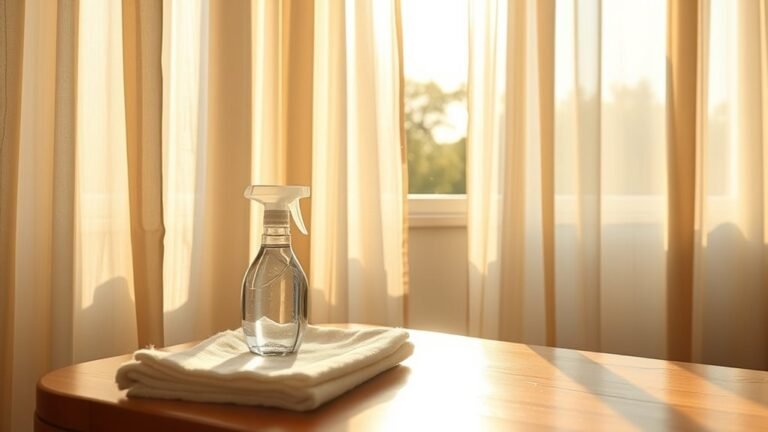Cleaning Tips for New Parents: Keeping Baby Areas Safe
To keep your baby’s space safe, choose gentle, baby-safe cleaning products free from harsh chemicals. Clean when your baby’s elsewhere and let surfaces dry fully before they return. Regularly disinfect toys with mild soap or baby detergent, and keep nursery items organized to reduce clutter and dust. Wash bedding weekly using hypoallergenic detergents, drying thoroughly to prevent germs. Following these simple steps protects your infant’s health and creates a clean, comfortable environment. There’s plenty more helpful advice to guarantee your little one’s space stays healthy.
Essential Cleaning Supplies for Baby Areas

Before you start cleaning your baby’s areas, it’s important to have the right supplies on hand. You’ll want to choose baby safe products that protect your little one and give you peace of mind. Eco friendly cleaners are a smart choice—they’re gentle, non-toxic, and better for the planet, so you’re not just caring for your baby but also the world they’ll grow up in. Stock up on wipes, sprays, and detergents labeled safe for infants, avoiding harsh chemicals and artificial fragrances. Having these essentials ready means you can clean quickly and confidently, maintaining a healthy space without stress. This way, you’re free to focus on what really matters—enjoying time with your baby, knowing their environment is safe and fresh.
Safe Cleaning Practices Around Infants
Once you have your baby-safe cleaning supplies ready, it’s important to follow safe cleaning practices around your little one. Choose natural cleaners and allergen free products to minimize exposure to harsh chemicals. Always clean when your baby is in a different room, allowing surfaces to dry completely before they return. Avoid spraying directly onto surfaces; instead, spray your cloth to prevent airborne particles. Keep all cleaning products out of reach and stored securely. Focus on high-touch areas but don’t overdo it—over-cleaning can strip away beneficial microbes. Ventilate the room well by opening windows or using a fan to help disperse any fumes. By adopting these safe habits, you’re creating a clean, toxin-free environment that supports your infant’s health and your family’s freedom to enjoy worry-free moments together.
How to Disinfect Toys and Baby Gear

Keeping your baby’s toys and gear clean is essential for preventing the spread of germs and keeping your little one healthy. You want to feel free from worry, knowing your child’s environment is safe. Here’s how to approach disinfecting methods based on toy materials:
- Plastic toys: Use warm soapy water or a vinegar-water solution for quick, effective cleaning.
- Fabric toys: Wash in the machine on a gentle cycle with baby-safe detergent.
- Wooden toys: Wipe down with a damp cloth and mild soap; avoid soaking to preserve the wood.
- Electronic gear: Use disinfectant wipes carefully, avoiding moisture near openings.
Maintaining a Clean Nursery Environment
Although it might seem overwhelming, maintaining a clean nursery is essential for your baby’s health and comfort. Prioritize nursery organization to reduce clutter, making cleaning easier and improving air quality. Regularly dust and vacuum to keep allergens at bay, and consider using an air purifier for fresher air.
| Task | Benefit |
|---|---|
| Declutter regularly | Simplifies cleaning |
| Dust & vacuum | Reduces allergens |
| Use air purifier | Enhances air quality |
Tips for Managing Laundry and Bedding Hygiene

A clean nursery goes beyond just the air and surfaces; managing laundry and bedding hygiene plays a big role in keeping your baby healthy. You want to feel free from constant worry about germs and irritants, so here are some tips to keep laundry baskets and bedding materials fresh and safe:
- Use separate laundry baskets for baby clothes and bedding to prevent cross-contamination.
- Wash bedding materials weekly with a gentle, hypoallergenic detergent to avoid skin irritation.
- Opt for breathable, natural bedding fabrics to reduce allergens and improve comfort.
- Dry everything thoroughly, preferably in sunlight, to kill bacteria and keep smells away.
Frequently Asked Questions
How Often Should Air Filters Be Changed in a Baby’S Room?
You should change air filters in your baby’s room every 1 to 3 months to keep baby air quality high and guarantee effective filter maintenance. If your baby has allergies or the room sees heavy use, changing filters more often helps maintain fresh air. Keeping this routine lets you enjoy your freedom without worrying about harmful particles, creating a safe, clean space where your little one can breathe easy and thrive.
Are Natural Cleaning Products Safe for Newborns?
You might wonder if natural cleaning products are truly safe for newborns. Generally, natural alternatives can be gentler and better for baby health since they often lack harsh chemicals found in conventional cleaners. However, you should still check ingredients and avoid anything with strong scents or allergens. Opting for plant-based, non-toxic options lets you keep your baby’s space clean while giving you the freedom to protect their delicate health naturally.
Can Pets Affect the Cleanliness of Baby Areas?
Don’t let the cat out of the bag—pets can definitely impact baby safety. If you want to keep your little one’s space squeaky clean, you’ll need to stay on top of pet hygiene. Regular baths and grooming for your furry friends help minimize dirt and allergens. Also, keep toys and bedding separate. This way, you can enjoy the freedom of both pet and baby without worrying about germs invading their safe haven.
What Is the Best Way to Store Cleaning Supplies Safely?
You’ll want to prioritize cleaning supply organization by using childproof storage solutions like locked cabinets or high shelves out of your child’s reach. This way, you keep harmful chemicals safely tucked away while maintaining easy access for yourself. Opt for clear bins or labeled containers to stay organized and save time. With these smart storage habits, you’ll enjoy the freedom of a clean home without worrying about your little one getting into anything dangerous.
How to Handle Mold Growth in Humid Nurseries?
If you spot mold growth in your nursery, act quickly to clean it with a mild detergent and water, avoiding harsh chemicals. For mold prevention, focus on humidity control—use a dehumidifier or air conditioner to keep moisture low, ideally below 50%. Open windows when possible to improve airflow. This way, you’ll keep the space fresh and safe without feeling restricted, giving your little one a healthy environment to grow freely.






